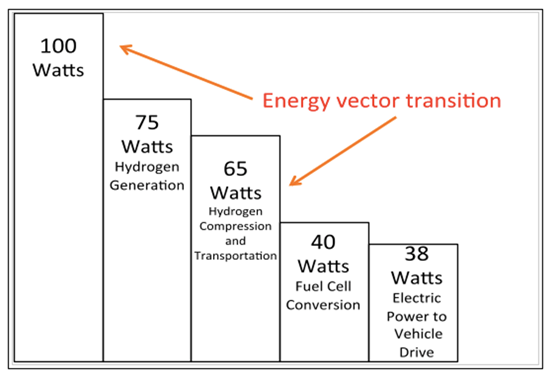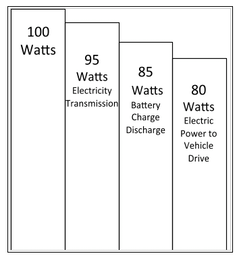There are many questions that are raised when discussion climate change and we aim to populate this section with useful information and to try and answer these as best we can.
If you have a question that you would like us answer- please drop us a line via the contacts page.
If you have a question that you would like us answer- please drop us a line via the contacts page.
Electric Vehicles
My friend told me that Electric vehicles are worse for the environment as the batteries are only good for 5-10 years then get discarded to landfill.
EVs have provability with millions of miles of verified data over the course of a decade.
Once batteries become degraded too much for suitable use in an EV (normally after in excess of 100,000 miles) they become well suited for redeployment as static Electrical Energy Storage Systems (EESS) (batteries) for use in buildings- both residential and commercial. Vehicles require a fast delivery system of energy, whilst buildings and grid support, generally, don't. The batteries can then realise an additional life in excess of another 10 years use.
After this the constituent components and materials can then readily be recycled and repurposed again into similar or identical applications.
Whilst most of these operations currently happen in Asia, there is significant investment into these facilities throughout Europe and the UK and it is anticipated that we will have on-shore facilities to do this in the near future. Investment is also being made into UK based Giga-factories.
I have heard that EVs use lots of conflict minerals in their production- such as Cobalt.
Whilst current and heritage EV batteries do use cobalt as part of their chemical make up, this is dramatically being reduced (most were ⅓ now 1/9 , with some manufacturers now declaring cobalt free products.
In actual fact, diesel production uses a factor of thousands more cobalt than EV production- a fact that is often never reported.
Is it true that EVs aren't clean as most of the energy used is still produced by coal and gas.
Coal very rarely plays a part in our electrical energy generation any more and at most is a couple of %. The UK has seen massive runs of electrical energy production with 0% coal in the past few years. Gas still plays a part through combined cycle gas turbines (CCGT) but the amount of renewably generated electricity, through solar PV and, in the main, wind turbines (onshore and offshore) is creating a low carbon electricity network and this will forever improve. The primary energy factor and embedded carbon content of electricity is now lower than gas and much lower than fossil based fuels.
Aren't hydrogen cars going to be much greener than EVs?
We would be foolish to think that hydrogen won’t play a part in the future energy scenario, due to the weight and influence of the industry pushing this solution, but we do need to consider its use carefully. Often its just the headline piece that peaks peoples interest- that the only emission from hydrogen use is ‘water’. Sounds fantastic but unfortunately that is only half the story.
Hydrogen can be obtained through a variety of processes, with the most common being through ‘Steam methane reforming (SMR) and electrolysis.
Steam Methane Reforming is a CO2 intensive process, requiring natural gas (other gases can be used) and additional heat. The multi-step process results in Hydrogen and CO2- the latter of which then needs to be sequestered through Carbon Capture and Storage (CCS). CCS still has a long way to go for it to be viable and economic on mass for the amount of hydrogen cited to be required.
Electrolysis, is the process of passing DC current through water to split the molecules into oxygen and hydrogen. This is environmentally viable only if the electricity being used is created through renewable electricity generation. Even then, because of the losses incurred through generation, transportation and use, it is often more efficient to have used the electricity required in the electrolysis process- directly at the point of use. If hydrogen made from electrolysis was used for heating homes, say, you would end up with just 62 per cent as much heat energy as the electrical energy you started with.
If electricity is instead used to a drive heat pump, you end up with 280 to 410 per cent more heat energy than the electricity consumed, because heat pumps use the electrical energy to extract the heat energy already present in the air or ground near a building.
There are also practical problems with hydrogen- as the molecules are tiny- it is more adept at leaking. It also has the propensity of producing air pollution in the form of nitrous oxides when burnt.
(https://www.newscientist.com/article/2186273-hydrogen-will-never-be-a-full-solution-to-our-green-energy-problems/#ixzz6S5HlgzCY)
The hydrogen concept is even worse with regard to hydrogen powered vehicles- giving an average round trip efficiency of only 38%.
My friend told me that Electric vehicles are worse for the environment as the batteries are only good for 5-10 years then get discarded to landfill.
EVs have provability with millions of miles of verified data over the course of a decade.
Once batteries become degraded too much for suitable use in an EV (normally after in excess of 100,000 miles) they become well suited for redeployment as static Electrical Energy Storage Systems (EESS) (batteries) for use in buildings- both residential and commercial. Vehicles require a fast delivery system of energy, whilst buildings and grid support, generally, don't. The batteries can then realise an additional life in excess of another 10 years use.
After this the constituent components and materials can then readily be recycled and repurposed again into similar or identical applications.
Whilst most of these operations currently happen in Asia, there is significant investment into these facilities throughout Europe and the UK and it is anticipated that we will have on-shore facilities to do this in the near future. Investment is also being made into UK based Giga-factories.
I have heard that EVs use lots of conflict minerals in their production- such as Cobalt.
Whilst current and heritage EV batteries do use cobalt as part of their chemical make up, this is dramatically being reduced (most were ⅓ now 1/9 , with some manufacturers now declaring cobalt free products.
In actual fact, diesel production uses a factor of thousands more cobalt than EV production- a fact that is often never reported.
Is it true that EVs aren't clean as most of the energy used is still produced by coal and gas.
Coal very rarely plays a part in our electrical energy generation any more and at most is a couple of %. The UK has seen massive runs of electrical energy production with 0% coal in the past few years. Gas still plays a part through combined cycle gas turbines (CCGT) but the amount of renewably generated electricity, through solar PV and, in the main, wind turbines (onshore and offshore) is creating a low carbon electricity network and this will forever improve. The primary energy factor and embedded carbon content of electricity is now lower than gas and much lower than fossil based fuels.
Aren't hydrogen cars going to be much greener than EVs?
We would be foolish to think that hydrogen won’t play a part in the future energy scenario, due to the weight and influence of the industry pushing this solution, but we do need to consider its use carefully. Often its just the headline piece that peaks peoples interest- that the only emission from hydrogen use is ‘water’. Sounds fantastic but unfortunately that is only half the story.
Hydrogen can be obtained through a variety of processes, with the most common being through ‘Steam methane reforming (SMR) and electrolysis.
Steam Methane Reforming is a CO2 intensive process, requiring natural gas (other gases can be used) and additional heat. The multi-step process results in Hydrogen and CO2- the latter of which then needs to be sequestered through Carbon Capture and Storage (CCS). CCS still has a long way to go for it to be viable and economic on mass for the amount of hydrogen cited to be required.
Electrolysis, is the process of passing DC current through water to split the molecules into oxygen and hydrogen. This is environmentally viable only if the electricity being used is created through renewable electricity generation. Even then, because of the losses incurred through generation, transportation and use, it is often more efficient to have used the electricity required in the electrolysis process- directly at the point of use. If hydrogen made from electrolysis was used for heating homes, say, you would end up with just 62 per cent as much heat energy as the electrical energy you started with.
If electricity is instead used to a drive heat pump, you end up with 280 to 410 per cent more heat energy than the electricity consumed, because heat pumps use the electrical energy to extract the heat energy already present in the air or ground near a building.
There are also practical problems with hydrogen- as the molecules are tiny- it is more adept at leaking. It also has the propensity of producing air pollution in the form of nitrous oxides when burnt.
(https://www.newscientist.com/article/2186273-hydrogen-will-never-be-a-full-solution-to-our-green-energy-problems/#ixzz6S5HlgzCY)
The hydrogen concept is even worse with regard to hydrogen powered vehicles- giving an average round trip efficiency of only 38%.
By comparison an EV has 80% efficiency:
Human psychology
Why do most people not seem to have a sense of urgency when it comes to climate change?
As human beings we aren’t wired to understand how things progress quickly. We have evolved to deal with things that are only a danger now. Climate Change is not seen as an immediate threat as the adrenaline rush doesn’t occur like it would for say a house fire or in a medical emergency. It’s important to understand this when talking to people about climate change.
Statistics
Sometimes statistics can be misleading or interpreted in the wrong way. Example: Currently, China produces the most of the world’s greenhouse gas emissions at 28% so often people will say China is the problem. However, since the Industrial Revolution, it is in fact Europe and the USA who have produced the most overall and as a result have also invested and profited the most from it. Therefore, it is important to understand it is not one country’s problem but all of ours.
Media. The word carbon reduction and carbon emissions is thrown about a lot by the media and in everyday terms. It’s important to remember, it’s carbon dioxide, the gas we want to refer to when talking about climate change. Carbon, the element, is important and every living thing is made up of carbon including human beings.
Why do most people not seem to have a sense of urgency when it comes to climate change?
As human beings we aren’t wired to understand how things progress quickly. We have evolved to deal with things that are only a danger now. Climate Change is not seen as an immediate threat as the adrenaline rush doesn’t occur like it would for say a house fire or in a medical emergency. It’s important to understand this when talking to people about climate change.
Statistics
Sometimes statistics can be misleading or interpreted in the wrong way. Example: Currently, China produces the most of the world’s greenhouse gas emissions at 28% so often people will say China is the problem. However, since the Industrial Revolution, it is in fact Europe and the USA who have produced the most overall and as a result have also invested and profited the most from it. Therefore, it is important to understand it is not one country’s problem but all of ours.
Media. The word carbon reduction and carbon emissions is thrown about a lot by the media and in everyday terms. It’s important to remember, it’s carbon dioxide, the gas we want to refer to when talking about climate change. Carbon, the element, is important and every living thing is made up of carbon including human beings.
Proudly powered by Weebly


